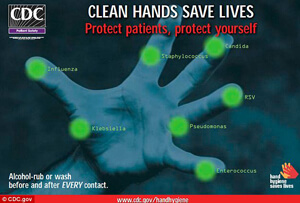
IMAGE: CDC
Hospitals across the nation are filled with some of the most educated, brightest minds in medicine.
So sometimes, it’s a bit baffling that something as simple as washing hands is a huge problem for many health care professionals.

IMAGE: CDC
Hospitals across the nation are filled with some of the most educated, brightest minds in medicine.
So sometimes, it’s a bit baffling that something as simple as washing hands is a huge problem for many health care professionals.
It’s the healthcare industry’s not-so-secret secret--- doctors and nurses aren’t washing their hands enough and it’s making patients horribly ill in the process, research shows.
One-in-six hospitals have patients who are contracting dangerous infections from the health workers who are supposed to be healing them.
According to the Centers for Disease Control, American hospital patients get an estimated 722,000 hospital acquired infections each year, which translates to one infection for every 25 patients.
About 75,000 of those who are infected die.
This isn’t due to hospital workers not washing their hands after using the bathroom or before eating.
Expectations for Healthcare Workers
The demand for hospital employee cleanliness is much higher, as it should be.
Professionals are expected to wash up:
(To see the Center for Disease Control’s complete guideline, visit http://www.cdc.gov/mmwr/PDF/rr/rr5116.pdf)
These precautions are required to prevent the spread of life-threatening infections.
However, The New York Times previously reported that healthcare workers are only scrubbing up 30 percent of the time when they’re required to work with patients.
With the hundreds of details nurses may have to do every day, from removing a catheter to administering medication, it’s easy to put all of your energy into the more challenging tasks, while forgetting the more simple things like hygiene.
But hospital infections don’t acknowledge brief bouts of amnesia and these incidents are costing facilities about $30 billion per year.
For the past couple years, the threat of losing Medicare funds under recent federal law changes has loomed over the healthcare industry. Medicare will pull its resources away from hospitals where patients get sick from preventable infections.
In an effort to get staff to cut costs, keep Medicare money and protect patients, hospitals have tried all kinds of methods to get doctors and nurses to comply.
One Long Island hospital installed cameras triggered by a heat sensor, so when someone enters the room, it starts recording. The video signal is reviewed half way around the world in India, where workers observe and report back as to whether workers are watching their hands. Some hospitals have implemented hand washing coaches, reward coupons and even ID chips that pinpoint when an employee has walked by a sink, yet the overall numbers for compliance are still abysmal.
So what can be done?
Some hospitals have taken the patient involvement approach, where they suggest patients ask their doctors and nurses, “Can you wash your hands?” before working on the patient.
However, that places an awful lot of responsibility on the patient, who in addition to being shy, may not be in the condition or right frame of mind to inquire about their caregiver’s hand washing compliance.
A more logical albeit costly solution might be a tech solution like Hygreen.
Hygreen is a hand hygiene monitoring and reminder device that records “hand hygiene events” at the hospital and reminds hospital workers to wash their hands before touching patients. http://hygreen.com/
Another option is hiring staff whose priority is “policing” hospital workers.
These employees could observe doctors and nurses, remind them to wash their hands, and perhaps implement a reward/penalty system based on compliance.
The bottom line is there’s no one-size-fits-all solution.
The threat of losing Medicare funding has certainly pushed hospitals to get employees in line, but this is a gradual, cultural shift that won’t happen overnight for hospital workers.
We encourage employees to make it a priority to clean up between patients, but more importantly; we encourage discussion about how to address the issue effectively.
We ask the readers, what would make hand-washing easier for health professionals? What motivates highly stressed, overworked nurses and doctors to go the extra mile?
Share and Comment!
LINKS